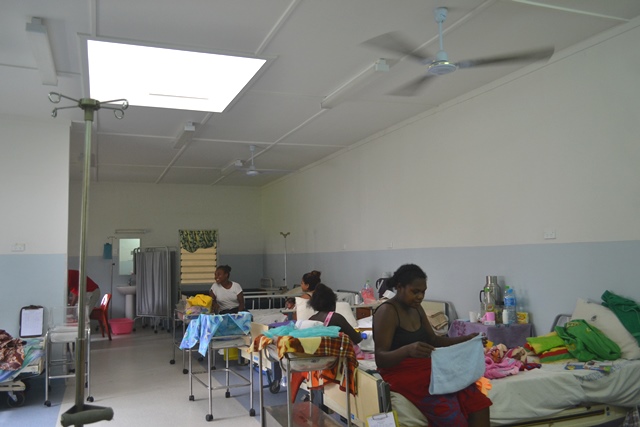SUVA, FIJI. 30 SEPTEMBER 2015 - Three Pacific Island countries using integrated approaches to health delivery for women, new-borns, children and adolescents will benefit from a nearly AU$7 million UN Joint Programme announced in New York as part of a meeting of Pacific Foreign Ministers.
The Australian Government's investment in the programme follows the announcement of the new Global Goals for Sustainable Development, the 2015-2030 targets that succeed the Millennium Development Goals. The new programme will particularly support Global Goals 3 (Good health and wellbeing) and 5 (Gender Equality), ensuring that all women, children and adolescents are able to access vital health services.

In New York, Australian Foreign Minister Julie Bishop noted that the AU$7 million investment will support the UN Secretary General's Global Strategy for Women's, Children's and Adolescents' Health, a global plan that brings together political leaders, the United Nations, private sector and philanthropists to save the lives and improve the health of more than 16 million women and children. Implementation of the global strategy by the Ministries of Health of Kiribati, Solomon islands and Vanuatu, in partnership with a UN Joint Programme by the United Nations Children's Fund (UNICEF), United Nations Population Fund (UNFPA) and World Health Organization (WHO), contributes to achievement of the ‘Healthy Islands' vision being led by Pacific governments, as well as Sustainable Development Goals 3 and 5.
Dr. Liu Yunguo, Director of Pacific Technical Support/WHO Representative to the South Pacific welcomed the initiative, saying "We will draw on the lessons learned in the more than 90 countries where the UN Secretary General's Global Strategy for Women and Children's Health is being implemented to harmonise our support to Vanuatu, Kiribati and the Solomon Islands".
The three UN agencies will work with the Governments of Kiribati, the Solomon Islands and Vanuatu to support integrated delivery of planning, budgeting and technical assistance, all in support of Government-led integrated plans and budgets.
"Combining the expertise and resources of UNICEF, WHO and UNFPA will allow targeted, efficient and effective assistance in pursuit of our common goal," said UNICEF Pacific Representative Dr Karen Allen. "The UN Joint Programme in Kiribati, the Solomon Islands and Vanuatu will complement ongoing New Zealand Government funding to UNICEF and UNFPA in the Pacific region, to accelerate achievement of targets to save the lives and improve the health of women, children and adolescents at risk from a wide range of interlinked health issues. "
The UN Joint Programme will support governments to make tangible improvements to the way they respond to health risks. Participating countries will be supported to treat health as a holistic set of interlinked issues, supporting integrated service delivery for vulnerable groups. A young mother, for example, will be able to seek reproductive health, family planning and nutrition advice in the same visit. In the past that may have required several visits on several days. The health professionals treating her will also be able to work in a way that reflects the integrated reality of their environment.
Kiribati, the Solomon Islands and Vanuatu have made considerable progress towards the UN Millennium Development Goals (MDGs) but several targets related to neonatal, child and maternal health will not be reached by the 2015 global deadline. The new Global Goals represent a commitment by 193 world leaders, including all Pacific leaders, to fill the remaining gaps and push development efforts even further forward, with the overarching goals of ending extreme poverty, fighting inequality and injustice, and fixing climate change.
"While we celebrate overall progress in the areas of sexual and reproductive health and rights for all persons, the global Sustainable Development Goals include the unfinished business of the MDGs; there is always more that can be done," said Dr Laurent Zessler, UNFPA's Director and Representative in the Pacific. "The leadership of Pacific nations must be commended for their commitment to these issues. UNFPA is very proud to be associated with this initiative."
- ENDS -
________________________________________
About UNFPA:
UNFPA is the lead UN agency for delivering a world where every pregnancy is wanted, every birth is safe, and every young person's potential is fulfilled. UNFPA expands the possibilities for women and young people to lead healthy and productive lives. Since UNFPA started working in 1969, the number - and rate - of women dying from complications of pregnancy or childbirth has been halved. Families are smaller and healthier. Young people are more connected and empowered than ever before. For more information about UNFPA and its work visit: http://countryoffice.unfpa.org/pacific/
About UNICEF:
UNICEF promotes the rights and wellbeing of every child, in everything we do. Together with our partners, we work in 190 countries and territories to translate that commitment into practical action, focusing special effort on reaching the most vulnerable and excluded children, to the benefit of all children, everywhere. For more information about UNICEF and its work visit: unicefpacific.org
About WHO:
The WHO operates as a catalyst and advocate for action at all levels, from local to global, on health issues of public concern. Our purpose is to lead the regional response to public health issues on all fronts - medical, technical, socio-economic, cultural, legal and political - towards the achievement of WHO's global health mission which is to support all countries and peoples in their quest to achieve the highest attainable level of health. This is defined in the WHO Constitution as "a state of complete physical, mental and social well-being and not merely the absence of disease or infirmity." For more information about WHO and its work visit: www.wpro.who.int/southpacific/en/
________________________________________
For further information, please contact:
UNICEF: Donna Hoerder, Tel: +679 9265 518 dhoerder@unicef.org
WHO: Madeline Salva, Tel : +679 3234 100 salvam@wpro.who.int
UNFPA: Ariela Zibiah, Tel: +679 999 1697 zibiah@unfpa.org
Australian Department of Foreign Affairs and Trade, Suva: Mere Nailatikau, Tel: +679 707 1258 Merewalesi.Nailatikau@dfat.gov.au

